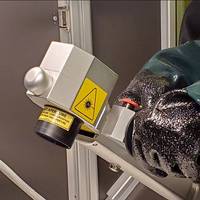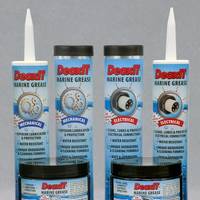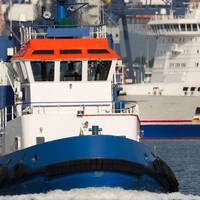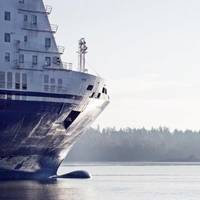Clean Technology Lasers: A New Tool to Remove Corrosion and Scale

Laser systems quickly remove corrosion and scale from metal surfaces with less preparation and mess than traditional techniques.In the maritime industry, corrosion and scale (where rust penetrates a metal surface) can quickly become an issue in an outdoor, salt sea spray laden environment. When sea spray evaporates, it leaves salt behind, leading to saltwater staining and accelerated corrosion.So, most shipbuilders as well as those responsible for maintenance and repair understand the value of treating metal surfaces to remove corrosion…
Marine Greases Address Surface Oxidation & Corrosion

While many current marine greases generally do a good job lubricating and protecting mechanical devices and equipment, they often do not address a common issue that affects all metals: existing oxidation/corrosion on the surfaces.U.S.-based CAIG Laboratories said its DeoxIT L27 Marine Mechanical and Electrical Greases are engineered for the lubrication and protecting metal surfaces, and they also contain special additives which remove and displace most surface oxidation and corrosion on metals.Manufactured in semi-solid form for use as a combination cleaning…
Lubrication Selection Fundamentals

As an operator of vessels, you understand that lubricants play an important role in helping you achieve your operational objectives. Yet, finding the right one can be overwhelming since there’s an almost unlimited number of different lubricant formulations. An understanding of lubrication chemistry, performance expectations and operational objectives will help you select a lubricant that will improve operations and lower your overall costs.Lubrication benefitsThe basic function of a lubricant is to reduce friction by separating interacting surfaces.
Coatings Quietly Helping to Control Noise
U.S. Navy’s AGOR Research Vessels are built to be as operationally quiet as possible. That’s where Mascoat’s Sound Control-dB coatings come in. When the U.S. Navy began its design and build program for its newest generation of research vessels, it specified that the vessels had to be as quiet as possible. That’s because a large part of ocean research involves listening and excessive ship noise tends to negate that effort. Achieving the goal of an exceptionally quiet vessel, the vessel’s design team employed a variety of methods to meet the Navy’s exacting standards, choosing systems, defined equipment locations and designed special installation methods with acoustics as a priority. One of those methods involved Mascoat’s Sound Control-dB coatings.
Sulfur Regulations Spur Fuel-saving Technologies

With many ship owners switching to marine gas oil (MGO) inside designated Emission Control Areas (ECAs) as of January 1, 2015, the cost of fuel could rise by up to 50%, so all measures to reduce fuel consumption are vital. Research and field testing has shown that the latest developments in engine lubrication and unique marine energy management systems can add more than a 15% improvement in fuel efficiency, proving that even the smallest modification at the right time can add up to big savings.
VGP-Compliant Stern Tube Lubricant
Water in oil lubricated systems is undesirable. In a perfect installation, there would be no seal damage or water ingress, but vessel owners encounter this all the time. Panolin's Stella Maris stern tube lubricant is based on 100% saturated synthetic ester technology with the most effective performance enhancing additives. This fully synthetic ISO VG 68, 100, 150 and 220 Stella Maris stern tube lubricant provides biodegradability and superior lubricity to protect metal surfaces, while meeting new 2013 VGP requirements. Stella Maris is not an emulsifying lubricant. It readily separates from water. The few emulsifying properties, approximately 800-1…
New coatings safer, last longer Bottom Line: It's Not Just A Paint Job
On the surface, the subject of paint seems simple. After all, it's just a paint job, right? For maritime applications, however, beauty is much more than skin deep. The coating of surfaces on ships is a complex combination of materials, chemicals and preparation to combat corrosion and maintain a sharp appearance. The coatings must wear well in the worst of weather and withstand the most extreme environments. They must last with little maintenance, must be earth friendly and safe for people and other living things, and last but certainly not least, they must be affordable. The paint job found on a contemporary ship may look the same as that of a ship of several decades ago, when in fact very little is the same.





